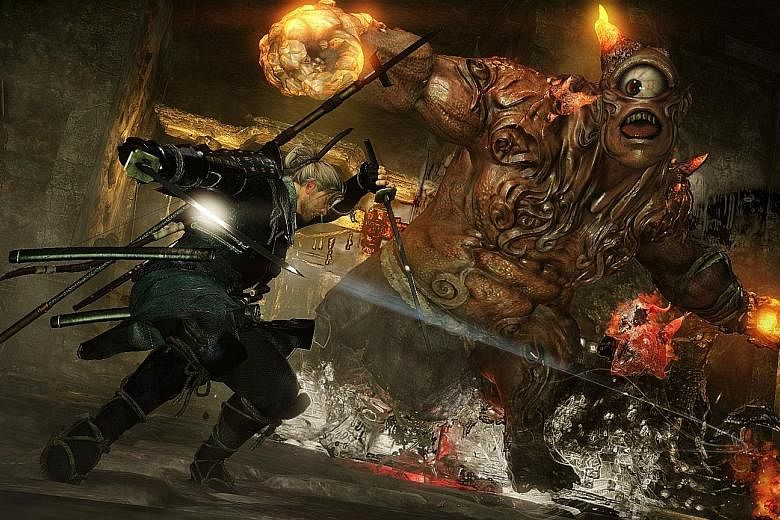Nioh takes its cue from the influential Dark Souls series of action role- playing games, but infuses it with Japanese mythology and history.
Set in Japan's war-torn Sengoku period, you play British sailor William Adams, who was one of the first Westerners to reach Japan.
Other actual historical figures that may be familiar to Japanese history buffs, such as Oda Nobunaga and Tokugawa Ieyasu, are woven into the story, which blends history with fantastical elements.
Adams is able to see and fight yokai, or demons in Japanese folklore. The game explains that his capacity to be revived after dying is because of his fairy guardian spirit. It has been kidnapped by the main villain, who is using it to locate Amrita, a magical substance with the power to bring back the dead.
Amrita is apparently plentiful in Japan, which is why Adams ends up in Japan and taking sides in the civil war raging in the country.
Unlike the minimalist storytelling in Dark Souls, Nioh uses conventional cutscenes. You access the main missions, as well as side quests via a map of Japan. Each mission is a self-contained level that is completed by beating the boss.
-
9/10 RATING
-
PRICE: $76.90 (PS4)
GENRE: Role-playing game
In short, those who found the Dark Souls series inaccessible or indecipherable will find Nioh more to their liking.
But just like in the Souls games, you'll soon get used to dying in Nioh, at least for ordinary gamers like me. When I am killed, I lose all my Amrita (or souls in the parlance of the Souls games), which is gained from killing enemies.
Upon respawning at the last shrine (akin to bonfires in the Souls games) that I had prayed at, I get one chance to run back to where I had died and retrieve my Amrita. Dying again enroute means the dropped Amrita is lost forever.
To avoid losing Amrita because of a careless mistake, I would usually use it up at a shrine as soon as possible, by levelling up or buying items. However, praying at a shrine respawns all the enemies that you had previously killed.
Thankfully, there are usually shortcuts that get you to the boss in each mission without going through a gauntlet of enemies. A typical playthrough boils down to this: explore the level, unlock shortcuts and confront the boss to finish the mission.
These gameplay mechanics aside, Nioh actually deviates from the Souls games in both good and bad ways.
Firstly, Adams has the ability to host a guardian spirit that grants him various buffs and abilities. As you progress, you unlock more of these spirits, though you can pick only one to equip.
More importantly, the guardian spirit can turn the tide in a tough battle with its Living Weapon ability that makes Adams invulnerable for a short while.
Managing your stamina, or Ki, in Nioh is as critical as it is in the Souls games. But Nioh's combat system is more complex. Ki can be regained by timing key presses and you can chain and unleash powerful combo attacks that are unlocked by spending skill points. Ninjutsu and magic are powerful tools to complement your weapon.
The character hitboxes, or target areas, in Nioh are incredibly precise. I was amazed the first time I managed to shoot an enemy in the head with a bow through a gap in the railing.
But I am less impressed by the loot system, which resembles Diablo. You'll find tons of items with randomly generated stats, which means you'll spend a lot of time managing your inventory. You will also need lots of luck if you want the best gear - a blacksmith, non-playing character crafts items using materials dropped from bosses. She can also change item stats for a fee, which often leads to constant "rerolling" till you get your ideal stat, or run out of gold.
Nioh's bosses are mostly drawn from Japanese folklore, so expect giant toads, demons and snakes. Compared with those in Souls games, Nioh's bosses are less scary, though they are comparable in difficulty. The range of enemies encountered in Nioh is also more limited.
• Verdict: It is easy to see why Nioh is compared to Dark Souls. It is more accessible, but just as challenging. Nioh's combat system is also better, though its level design and bosses are not quite as imaginative as those in the Souls games.


